Challenges of Managing Millennials in the Workplace: A Report
VerifiedAdded on 2023/01/03
|11
|2940
|84
Report
AI Summary
This report examines the challenges and issues surrounding millennials in the workplace, drawing on existing literature and personal experiences. The paper begins with an abstract and table of contents, followed by an introduction defining millennials and their presence in the workforce. The literature review explores key issues such as work-life balance, social consciousness, and communication gaps between millennials and older generations, referencing multiple academic sources. A critical discussion analyzes these issues, highlighting differences in work ethics, expectations, and the impact of social media. The report concludes with recommendations for managers, including implementing proper leadership styles, understanding millennial work processes, and creating a more inclusive work environment. The assignment fulfills the requirements of a critical analysis and response, incorporating both research findings and real-world experiences to propose effective management strategies.
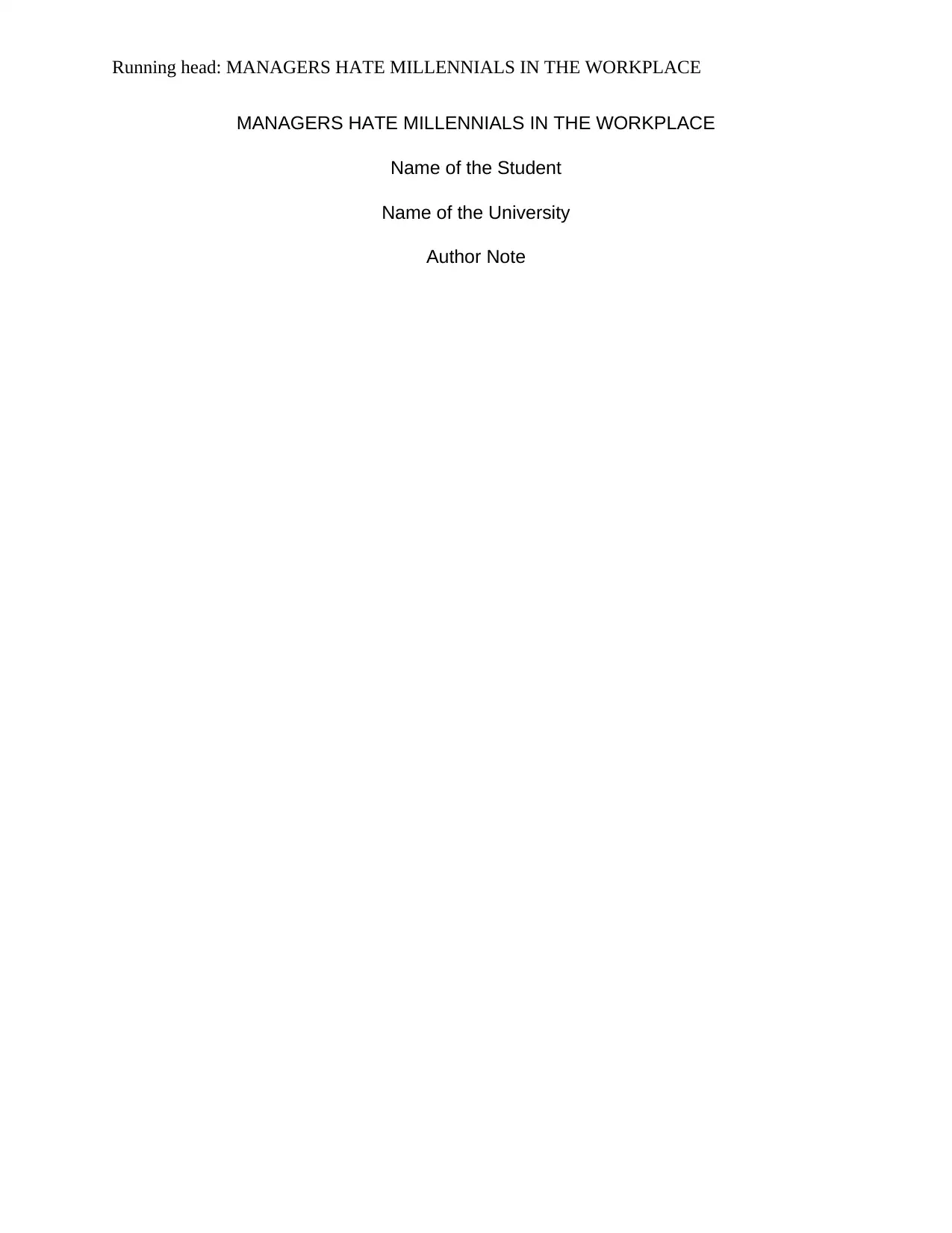
Running head: MANAGERS HATE MILLENNIALS IN THE WORKPLACE
MANAGERS HATE MILLENNIALS IN THE WORKPLACE
Name of the Student
Name of the University
Author Note
MANAGERS HATE MILLENNIALS IN THE WORKPLACE
Name of the Student
Name of the University
Author Note
Paraphrase This Document
Need a fresh take? Get an instant paraphrase of this document with our AI Paraphraser
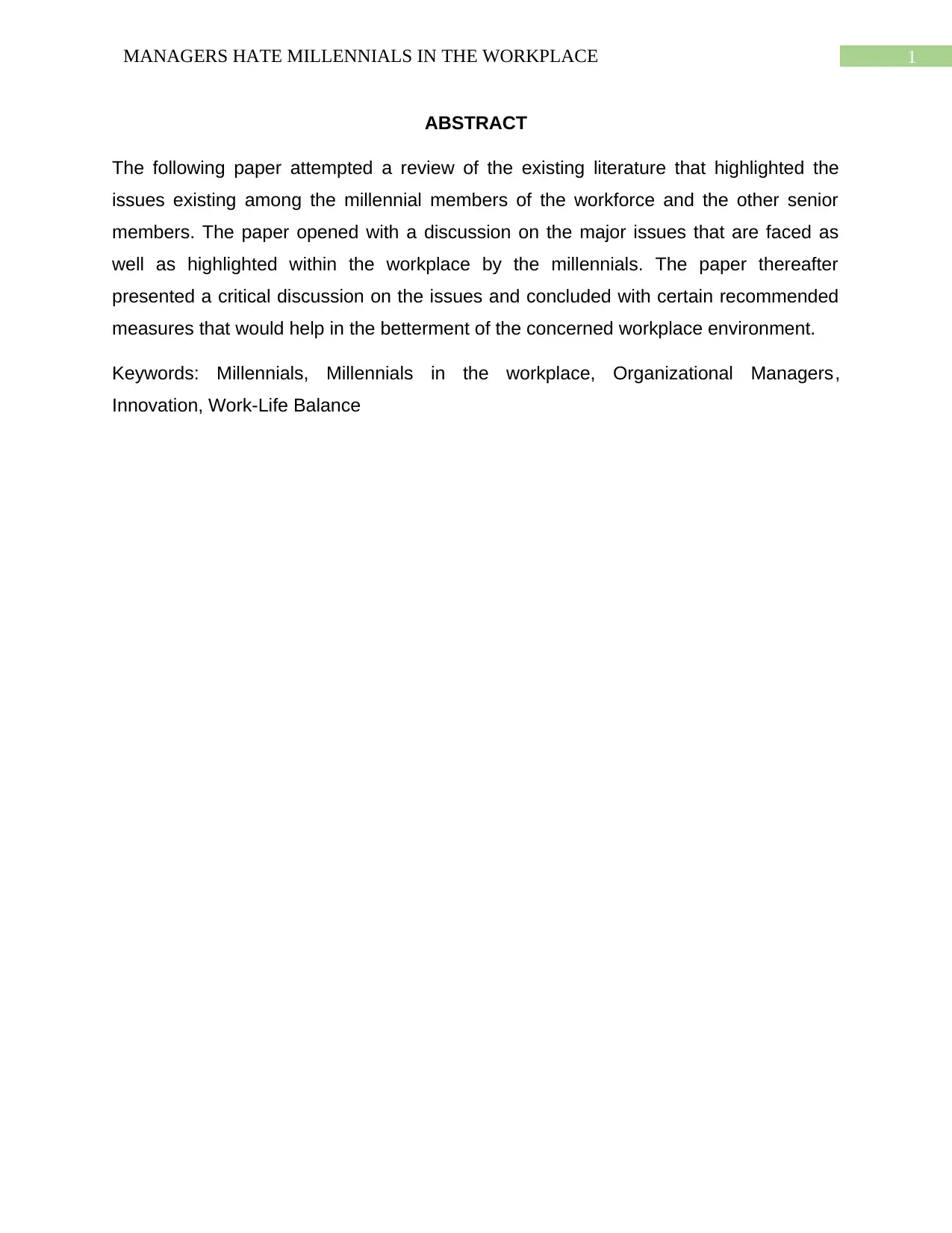
1MANAGERS HATE MILLENNIALS IN THE WORKPLACE
ABSTRACT
The following paper attempted a review of the existing literature that highlighted the
issues existing among the millennial members of the workforce and the other senior
members. The paper opened with a discussion on the major issues that are faced as
well as highlighted within the workplace by the millennials. The paper thereafter
presented a critical discussion on the issues and concluded with certain recommended
measures that would help in the betterment of the concerned workplace environment.
Keywords: Millennials, Millennials in the workplace, Organizational Managers,
Innovation, Work-Life Balance
ABSTRACT
The following paper attempted a review of the existing literature that highlighted the
issues existing among the millennial members of the workforce and the other senior
members. The paper opened with a discussion on the major issues that are faced as
well as highlighted within the workplace by the millennials. The paper thereafter
presented a critical discussion on the issues and concluded with certain recommended
measures that would help in the betterment of the concerned workplace environment.
Keywords: Millennials, Millennials in the workplace, Organizational Managers,
Innovation, Work-Life Balance
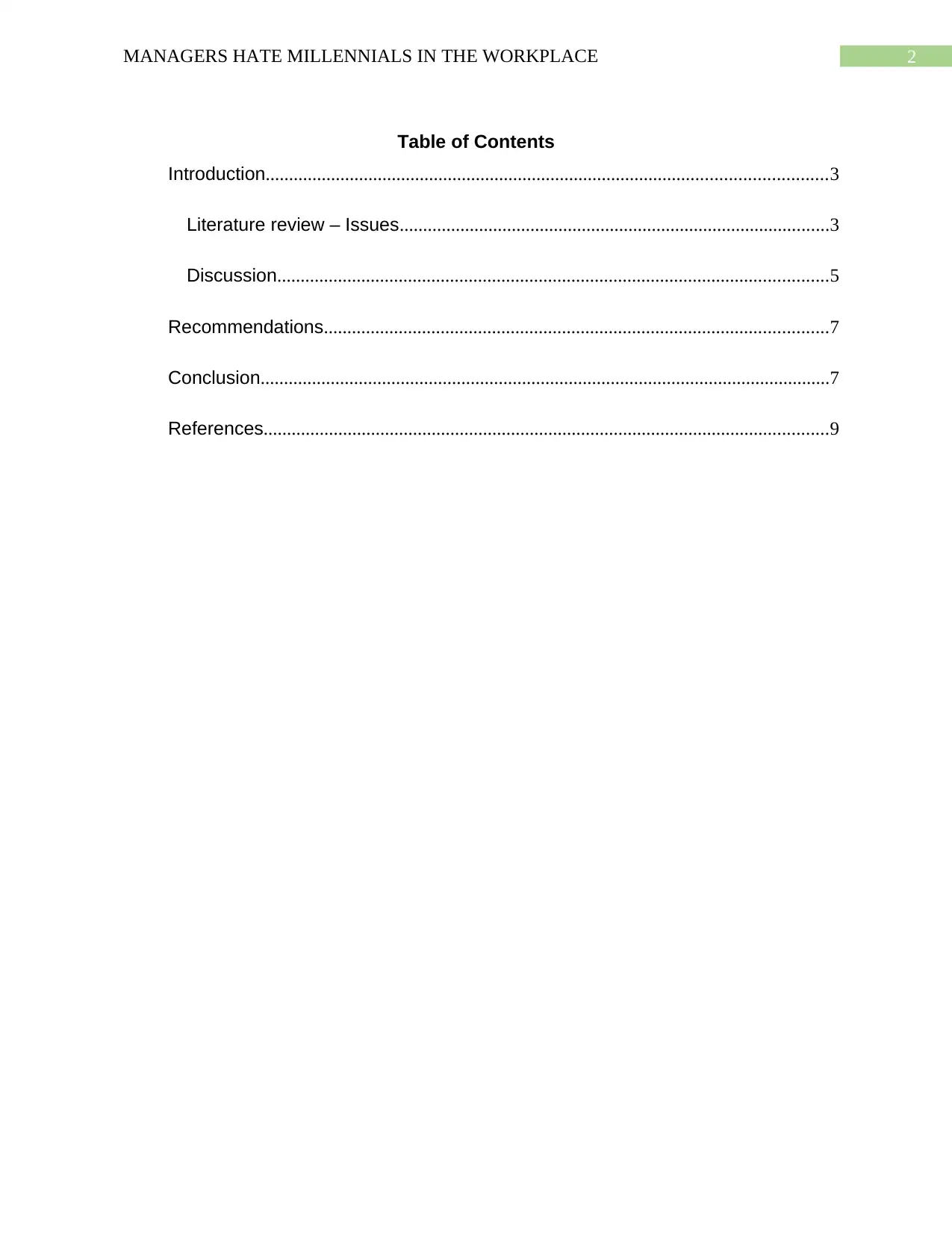
2MANAGERS HATE MILLENNIALS IN THE WORKPLACE
Table of Contents
Introduction........................................................................................................................3
Literature review – Issues............................................................................................3
Discussion......................................................................................................................5
Recommendations............................................................................................................7
Conclusion..........................................................................................................................7
References.........................................................................................................................9
Table of Contents
Introduction........................................................................................................................3
Literature review – Issues............................................................................................3
Discussion......................................................................................................................5
Recommendations............................................................................................................7
Conclusion..........................................................................................................................7
References.........................................................................................................................9
⊘ This is a preview!⊘
Do you want full access?
Subscribe today to unlock all pages.

Trusted by 1+ million students worldwide
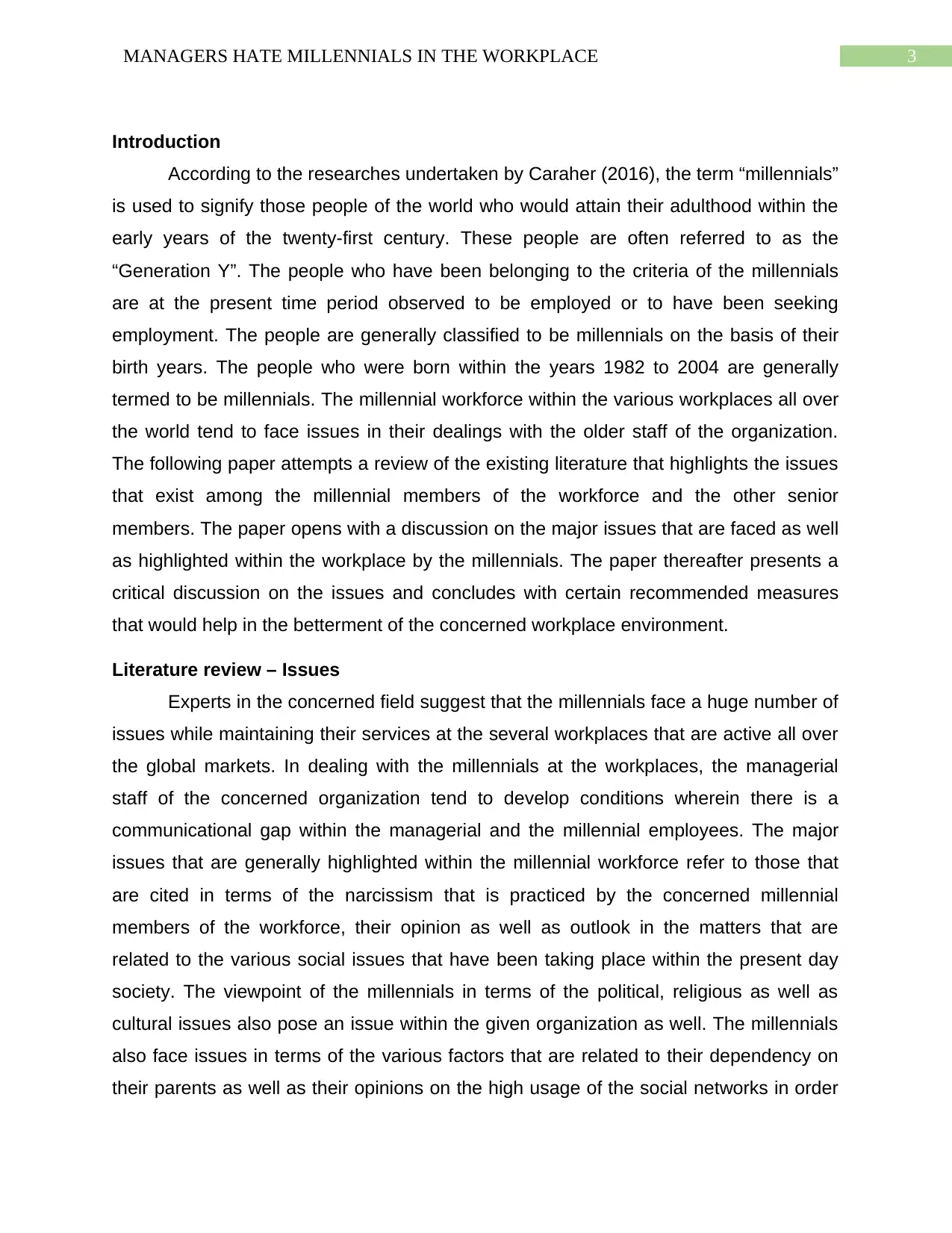
3MANAGERS HATE MILLENNIALS IN THE WORKPLACE
Introduction
According to the researches undertaken by Caraher (2016), the term “millennials”
is used to signify those people of the world who would attain their adulthood within the
early years of the twenty-first century. These people are often referred to as the
“Generation Y”. The people who have been belonging to the criteria of the millennials
are at the present time period observed to be employed or to have been seeking
employment. The people are generally classified to be millennials on the basis of their
birth years. The people who were born within the years 1982 to 2004 are generally
termed to be millennials. The millennial workforce within the various workplaces all over
the world tend to face issues in their dealings with the older staff of the organization.
The following paper attempts a review of the existing literature that highlights the issues
that exist among the millennial members of the workforce and the other senior
members. The paper opens with a discussion on the major issues that are faced as well
as highlighted within the workplace by the millennials. The paper thereafter presents a
critical discussion on the issues and concludes with certain recommended measures
that would help in the betterment of the concerned workplace environment.
Literature review – Issues
Experts in the concerned field suggest that the millennials face a huge number of
issues while maintaining their services at the several workplaces that are active all over
the global markets. In dealing with the millennials at the workplaces, the managerial
staff of the concerned organization tend to develop conditions wherein there is a
communicational gap within the managerial and the millennial employees. The major
issues that are generally highlighted within the millennial workforce refer to those that
are cited in terms of the narcissism that is practiced by the concerned millennial
members of the workforce, their opinion as well as outlook in the matters that are
related to the various social issues that have been taking place within the present day
society. The viewpoint of the millennials in terms of the political, religious as well as
cultural issues also pose an issue within the given organization as well. The millennials
also face issues in terms of the various factors that are related to their dependency on
their parents as well as their opinions on the high usage of the social networks in order
Introduction
According to the researches undertaken by Caraher (2016), the term “millennials”
is used to signify those people of the world who would attain their adulthood within the
early years of the twenty-first century. These people are often referred to as the
“Generation Y”. The people who have been belonging to the criteria of the millennials
are at the present time period observed to be employed or to have been seeking
employment. The people are generally classified to be millennials on the basis of their
birth years. The people who were born within the years 1982 to 2004 are generally
termed to be millennials. The millennial workforce within the various workplaces all over
the world tend to face issues in their dealings with the older staff of the organization.
The following paper attempts a review of the existing literature that highlights the issues
that exist among the millennial members of the workforce and the other senior
members. The paper opens with a discussion on the major issues that are faced as well
as highlighted within the workplace by the millennials. The paper thereafter presents a
critical discussion on the issues and concludes with certain recommended measures
that would help in the betterment of the concerned workplace environment.
Literature review – Issues
Experts in the concerned field suggest that the millennials face a huge number of
issues while maintaining their services at the several workplaces that are active all over
the global markets. In dealing with the millennials at the workplaces, the managerial
staff of the concerned organization tend to develop conditions wherein there is a
communicational gap within the managerial and the millennial employees. The major
issues that are generally highlighted within the millennial workforce refer to those that
are cited in terms of the narcissism that is practiced by the concerned millennial
members of the workforce, their opinion as well as outlook in the matters that are
related to the various social issues that have been taking place within the present day
society. The viewpoint of the millennials in terms of the political, religious as well as
cultural issues also pose an issue within the given organization as well. The millennials
also face issues in terms of the various factors that are related to their dependency on
their parents as well as their opinions on the high usage of the social networks in order
Paraphrase This Document
Need a fresh take? Get an instant paraphrase of this document with our AI Paraphraser
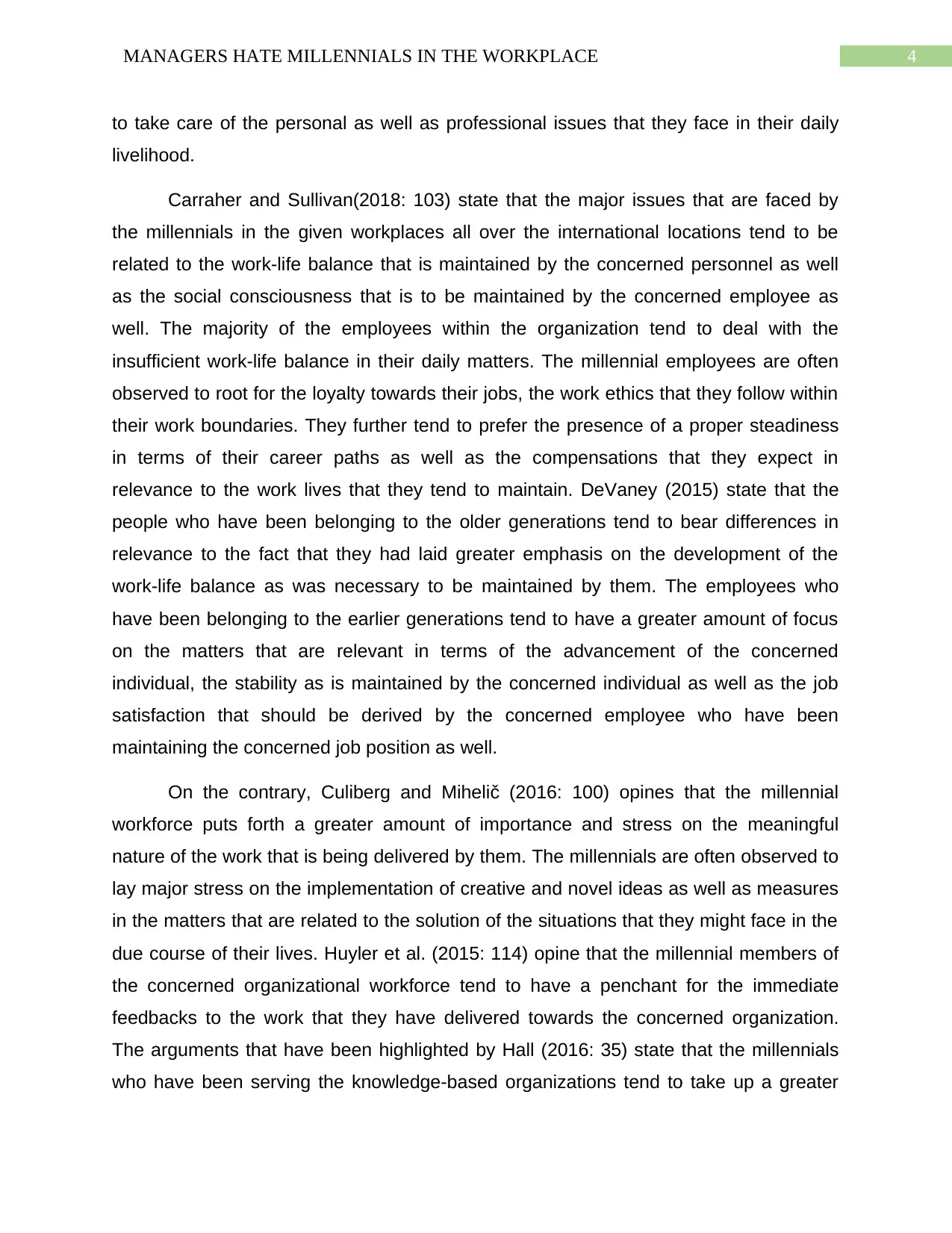
4MANAGERS HATE MILLENNIALS IN THE WORKPLACE
to take care of the personal as well as professional issues that they face in their daily
livelihood.
Carraher and Sullivan(2018: 103) state that the major issues that are faced by
the millennials in the given workplaces all over the international locations tend to be
related to the work-life balance that is maintained by the concerned personnel as well
as the social consciousness that is to be maintained by the concerned employee as
well. The majority of the employees within the organization tend to deal with the
insufficient work-life balance in their daily matters. The millennial employees are often
observed to root for the loyalty towards their jobs, the work ethics that they follow within
their work boundaries. They further tend to prefer the presence of a proper steadiness
in terms of their career paths as well as the compensations that they expect in
relevance to the work lives that they tend to maintain. DeVaney (2015) state that the
people who have been belonging to the older generations tend to bear differences in
relevance to the fact that they had laid greater emphasis on the development of the
work-life balance as was necessary to be maintained by them. The employees who
have been belonging to the earlier generations tend to have a greater amount of focus
on the matters that are relevant in terms of the advancement of the concerned
individual, the stability as is maintained by the concerned individual as well as the job
satisfaction that should be derived by the concerned employee who have been
maintaining the concerned job position as well.
On the contrary, Culiberg and Mihelič (2016: 100) opines that the millennial
workforce puts forth a greater amount of importance and stress on the meaningful
nature of the work that is being delivered by them. The millennials are often observed to
lay major stress on the implementation of creative and novel ideas as well as measures
in the matters that are related to the solution of the situations that they might face in the
due course of their lives. Huyler et al. (2015: 114) opine that the millennial members of
the concerned organizational workforce tend to have a penchant for the immediate
feedbacks to the work that they have delivered towards the concerned organization.
The arguments that have been highlighted by Hall (2016: 35) state that the millennials
who have been serving the knowledge-based organizations tend to take up a greater
to take care of the personal as well as professional issues that they face in their daily
livelihood.
Carraher and Sullivan(2018: 103) state that the major issues that are faced by
the millennials in the given workplaces all over the international locations tend to be
related to the work-life balance that is maintained by the concerned personnel as well
as the social consciousness that is to be maintained by the concerned employee as
well. The majority of the employees within the organization tend to deal with the
insufficient work-life balance in their daily matters. The millennial employees are often
observed to root for the loyalty towards their jobs, the work ethics that they follow within
their work boundaries. They further tend to prefer the presence of a proper steadiness
in terms of their career paths as well as the compensations that they expect in
relevance to the work lives that they tend to maintain. DeVaney (2015) state that the
people who have been belonging to the older generations tend to bear differences in
relevance to the fact that they had laid greater emphasis on the development of the
work-life balance as was necessary to be maintained by them. The employees who
have been belonging to the earlier generations tend to have a greater amount of focus
on the matters that are relevant in terms of the advancement of the concerned
individual, the stability as is maintained by the concerned individual as well as the job
satisfaction that should be derived by the concerned employee who have been
maintaining the concerned job position as well.
On the contrary, Culiberg and Mihelič (2016: 100) opines that the millennial
workforce puts forth a greater amount of importance and stress on the meaningful
nature of the work that is being delivered by them. The millennials are often observed to
lay major stress on the implementation of creative and novel ideas as well as measures
in the matters that are related to the solution of the situations that they might face in the
due course of their lives. Huyler et al. (2015: 114) opine that the millennial members of
the concerned organizational workforce tend to have a penchant for the immediate
feedbacks to the work that they have delivered towards the concerned organization.
The arguments that have been highlighted by Hall (2016: 35) state that the millennials
who have been serving the knowledge-based organizations tend to take up a greater
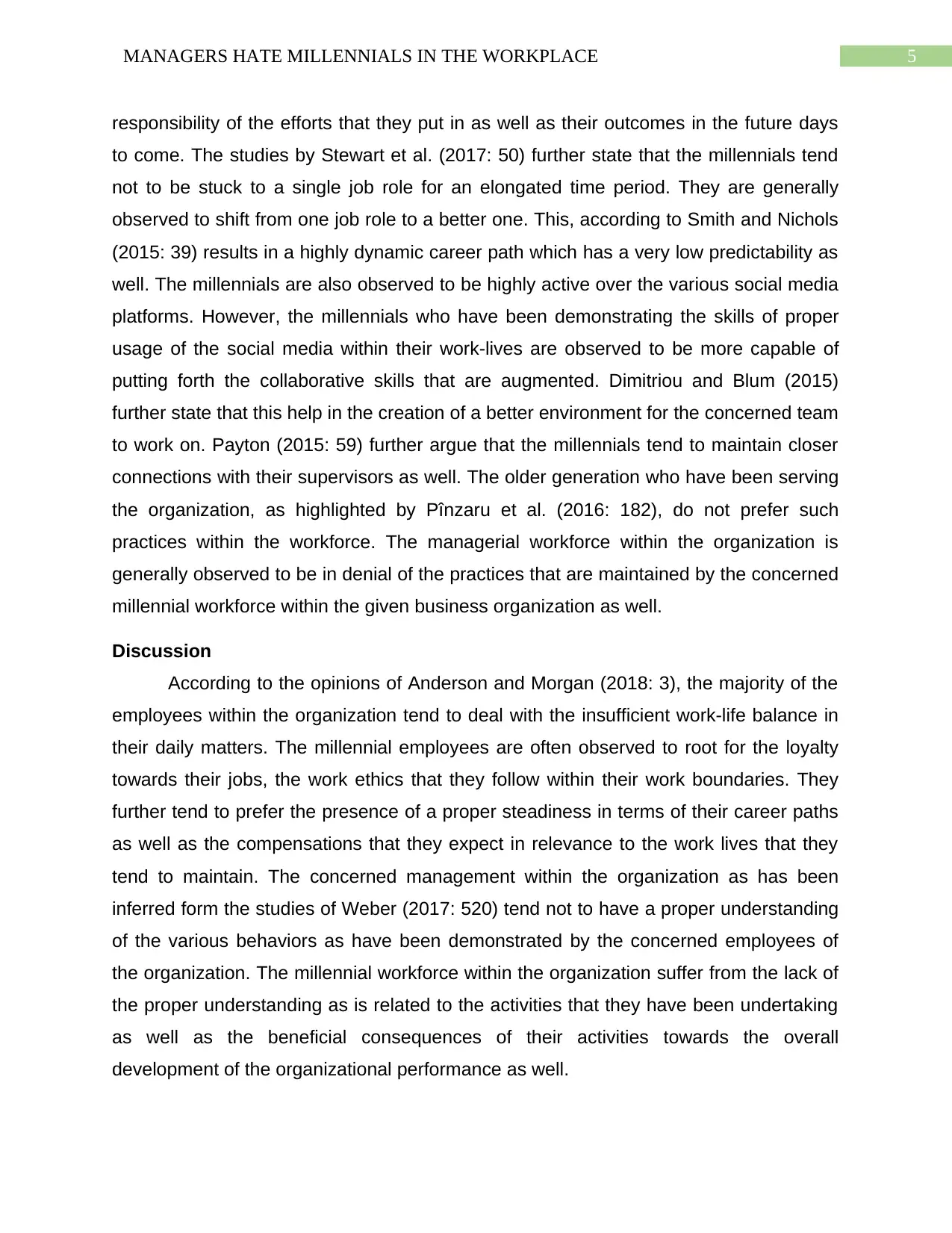
5MANAGERS HATE MILLENNIALS IN THE WORKPLACE
responsibility of the efforts that they put in as well as their outcomes in the future days
to come. The studies by Stewart et al. (2017: 50) further state that the millennials tend
not to be stuck to a single job role for an elongated time period. They are generally
observed to shift from one job role to a better one. This, according to Smith and Nichols
(2015: 39) results in a highly dynamic career path which has a very low predictability as
well. The millennials are also observed to be highly active over the various social media
platforms. However, the millennials who have been demonstrating the skills of proper
usage of the social media within their work-lives are observed to be more capable of
putting forth the collaborative skills that are augmented. Dimitriou and Blum (2015)
further state that this help in the creation of a better environment for the concerned team
to work on. Payton (2015: 59) further argue that the millennials tend to maintain closer
connections with their supervisors as well. The older generation who have been serving
the organization, as highlighted by Pînzaru et al. (2016: 182), do not prefer such
practices within the workforce. The managerial workforce within the organization is
generally observed to be in denial of the practices that are maintained by the concerned
millennial workforce within the given business organization as well.
Discussion
According to the opinions of Anderson and Morgan (2018: 3), the majority of the
employees within the organization tend to deal with the insufficient work-life balance in
their daily matters. The millennial employees are often observed to root for the loyalty
towards their jobs, the work ethics that they follow within their work boundaries. They
further tend to prefer the presence of a proper steadiness in terms of their career paths
as well as the compensations that they expect in relevance to the work lives that they
tend to maintain. The concerned management within the organization as has been
inferred form the studies of Weber (2017: 520) tend not to have a proper understanding
of the various behaviors as have been demonstrated by the concerned employees of
the organization. The millennial workforce within the organization suffer from the lack of
the proper understanding as is related to the activities that they have been undertaking
as well as the beneficial consequences of their activities towards the overall
development of the organizational performance as well.
responsibility of the efforts that they put in as well as their outcomes in the future days
to come. The studies by Stewart et al. (2017: 50) further state that the millennials tend
not to be stuck to a single job role for an elongated time period. They are generally
observed to shift from one job role to a better one. This, according to Smith and Nichols
(2015: 39) results in a highly dynamic career path which has a very low predictability as
well. The millennials are also observed to be highly active over the various social media
platforms. However, the millennials who have been demonstrating the skills of proper
usage of the social media within their work-lives are observed to be more capable of
putting forth the collaborative skills that are augmented. Dimitriou and Blum (2015)
further state that this help in the creation of a better environment for the concerned team
to work on. Payton (2015: 59) further argue that the millennials tend to maintain closer
connections with their supervisors as well. The older generation who have been serving
the organization, as highlighted by Pînzaru et al. (2016: 182), do not prefer such
practices within the workforce. The managerial workforce within the organization is
generally observed to be in denial of the practices that are maintained by the concerned
millennial workforce within the given business organization as well.
Discussion
According to the opinions of Anderson and Morgan (2018: 3), the majority of the
employees within the organization tend to deal with the insufficient work-life balance in
their daily matters. The millennial employees are often observed to root for the loyalty
towards their jobs, the work ethics that they follow within their work boundaries. They
further tend to prefer the presence of a proper steadiness in terms of their career paths
as well as the compensations that they expect in relevance to the work lives that they
tend to maintain. The concerned management within the organization as has been
inferred form the studies of Weber (2017: 520) tend not to have a proper understanding
of the various behaviors as have been demonstrated by the concerned employees of
the organization. The millennial workforce within the organization suffer from the lack of
the proper understanding as is related to the activities that they have been undertaking
as well as the beneficial consequences of their activities towards the overall
development of the organizational performance as well.
⊘ This is a preview!⊘
Do you want full access?
Subscribe today to unlock all pages.

Trusted by 1+ million students worldwide
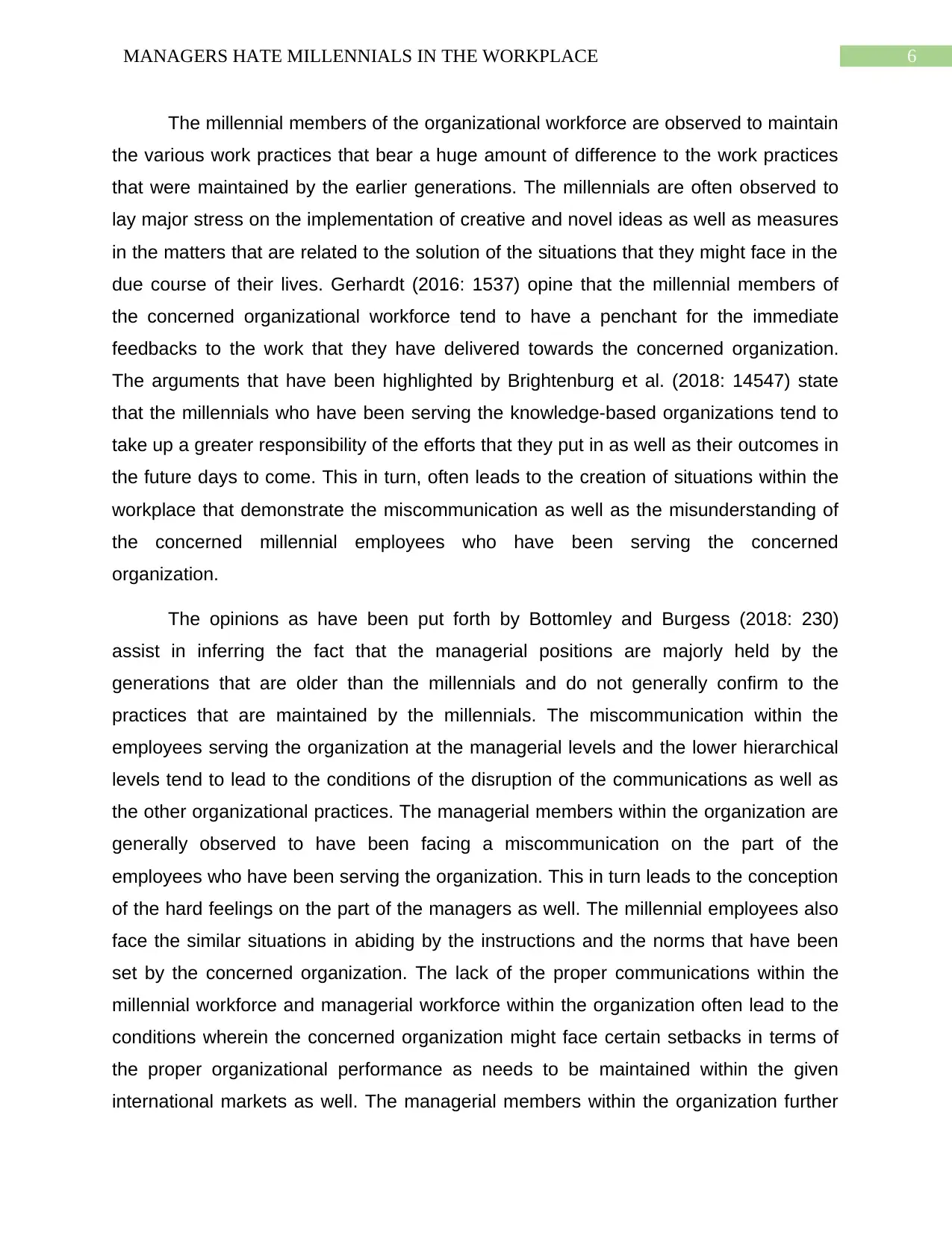
6MANAGERS HATE MILLENNIALS IN THE WORKPLACE
The millennial members of the organizational workforce are observed to maintain
the various work practices that bear a huge amount of difference to the work practices
that were maintained by the earlier generations. The millennials are often observed to
lay major stress on the implementation of creative and novel ideas as well as measures
in the matters that are related to the solution of the situations that they might face in the
due course of their lives. Gerhardt (2016: 1537) opine that the millennial members of
the concerned organizational workforce tend to have a penchant for the immediate
feedbacks to the work that they have delivered towards the concerned organization.
The arguments that have been highlighted by Brightenburg et al. (2018: 14547) state
that the millennials who have been serving the knowledge-based organizations tend to
take up a greater responsibility of the efforts that they put in as well as their outcomes in
the future days to come. This in turn, often leads to the creation of situations within the
workplace that demonstrate the miscommunication as well as the misunderstanding of
the concerned millennial employees who have been serving the concerned
organization.
The opinions as have been put forth by Bottomley and Burgess (2018: 230)
assist in inferring the fact that the managerial positions are majorly held by the
generations that are older than the millennials and do not generally confirm to the
practices that are maintained by the millennials. The miscommunication within the
employees serving the organization at the managerial levels and the lower hierarchical
levels tend to lead to the conditions of the disruption of the communications as well as
the other organizational practices. The managerial members within the organization are
generally observed to have been facing a miscommunication on the part of the
employees who have been serving the organization. This in turn leads to the conception
of the hard feelings on the part of the managers as well. The millennial employees also
face the similar situations in abiding by the instructions and the norms that have been
set by the concerned organization. The lack of the proper communications within the
millennial workforce and managerial workforce within the organization often lead to the
conditions wherein the concerned organization might face certain setbacks in terms of
the proper organizational performance as needs to be maintained within the given
international markets as well. The managerial members within the organization further
The millennial members of the organizational workforce are observed to maintain
the various work practices that bear a huge amount of difference to the work practices
that were maintained by the earlier generations. The millennials are often observed to
lay major stress on the implementation of creative and novel ideas as well as measures
in the matters that are related to the solution of the situations that they might face in the
due course of their lives. Gerhardt (2016: 1537) opine that the millennial members of
the concerned organizational workforce tend to have a penchant for the immediate
feedbacks to the work that they have delivered towards the concerned organization.
The arguments that have been highlighted by Brightenburg et al. (2018: 14547) state
that the millennials who have been serving the knowledge-based organizations tend to
take up a greater responsibility of the efforts that they put in as well as their outcomes in
the future days to come. This in turn, often leads to the creation of situations within the
workplace that demonstrate the miscommunication as well as the misunderstanding of
the concerned millennial employees who have been serving the concerned
organization.
The opinions as have been put forth by Bottomley and Burgess (2018: 230)
assist in inferring the fact that the managerial positions are majorly held by the
generations that are older than the millennials and do not generally confirm to the
practices that are maintained by the millennials. The miscommunication within the
employees serving the organization at the managerial levels and the lower hierarchical
levels tend to lead to the conditions of the disruption of the communications as well as
the other organizational practices. The managerial members within the organization are
generally observed to have been facing a miscommunication on the part of the
employees who have been serving the organization. This in turn leads to the conception
of the hard feelings on the part of the managers as well. The millennial employees also
face the similar situations in abiding by the instructions and the norms that have been
set by the concerned organization. The lack of the proper communications within the
millennial workforce and managerial workforce within the organization often lead to the
conditions wherein the concerned organization might face certain setbacks in terms of
the proper organizational performance as needs to be maintained within the given
international markets as well. The managerial members within the organization further
Paraphrase This Document
Need a fresh take? Get an instant paraphrase of this document with our AI Paraphraser
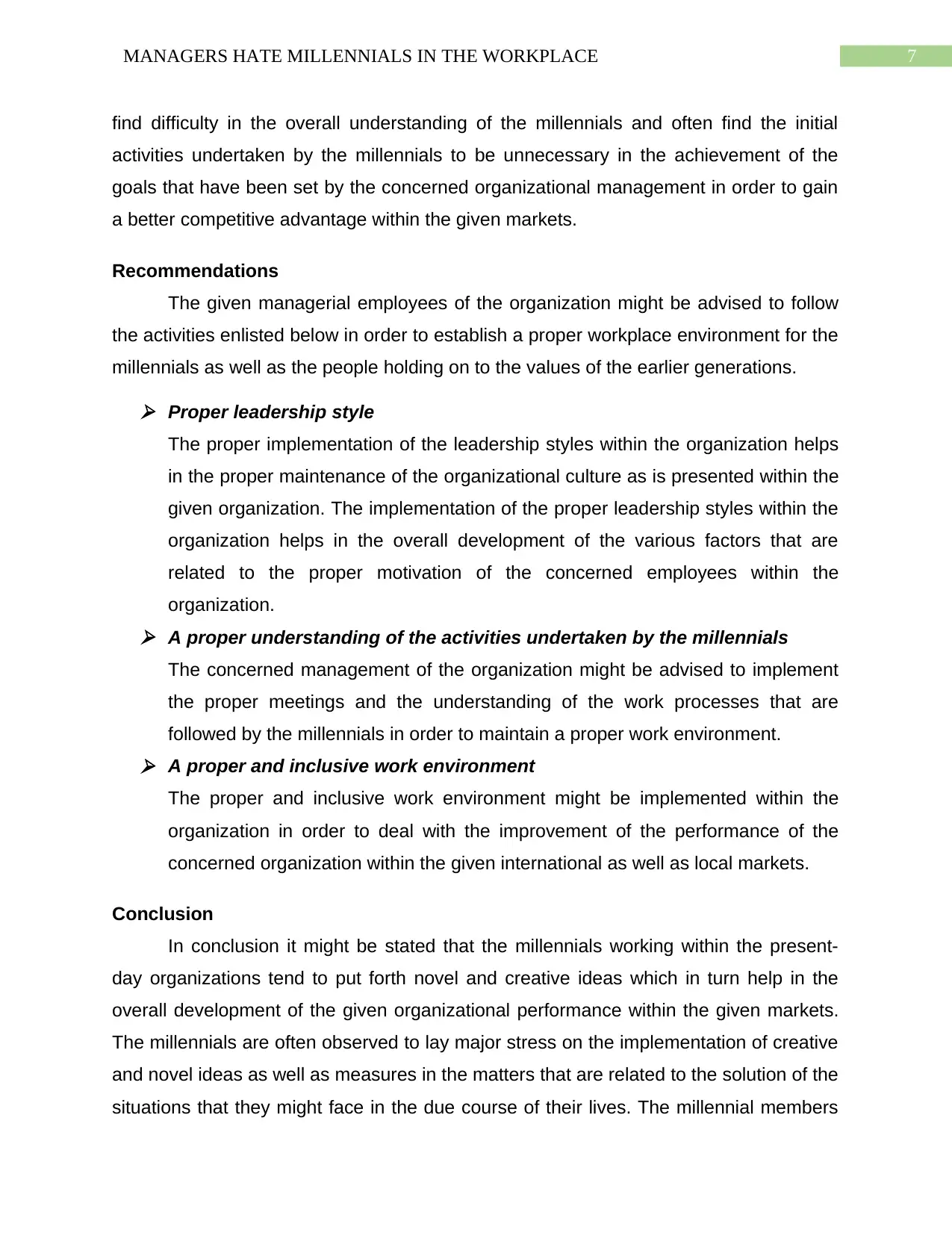
7MANAGERS HATE MILLENNIALS IN THE WORKPLACE
find difficulty in the overall understanding of the millennials and often find the initial
activities undertaken by the millennials to be unnecessary in the achievement of the
goals that have been set by the concerned organizational management in order to gain
a better competitive advantage within the given markets.
Recommendations
The given managerial employees of the organization might be advised to follow
the activities enlisted below in order to establish a proper workplace environment for the
millennials as well as the people holding on to the values of the earlier generations. Proper leadership style
The proper implementation of the leadership styles within the organization helps
in the proper maintenance of the organizational culture as is presented within the
given organization. The implementation of the proper leadership styles within the
organization helps in the overall development of the various factors that are
related to the proper motivation of the concerned employees within the
organization. A proper understanding of the activities undertaken by the millennials
The concerned management of the organization might be advised to implement
the proper meetings and the understanding of the work processes that are
followed by the millennials in order to maintain a proper work environment. A proper and inclusive work environment
The proper and inclusive work environment might be implemented within the
organization in order to deal with the improvement of the performance of the
concerned organization within the given international as well as local markets.
Conclusion
In conclusion it might be stated that the millennials working within the present-
day organizations tend to put forth novel and creative ideas which in turn help in the
overall development of the given organizational performance within the given markets.
The millennials are often observed to lay major stress on the implementation of creative
and novel ideas as well as measures in the matters that are related to the solution of the
situations that they might face in the due course of their lives. The millennial members
find difficulty in the overall understanding of the millennials and often find the initial
activities undertaken by the millennials to be unnecessary in the achievement of the
goals that have been set by the concerned organizational management in order to gain
a better competitive advantage within the given markets.
Recommendations
The given managerial employees of the organization might be advised to follow
the activities enlisted below in order to establish a proper workplace environment for the
millennials as well as the people holding on to the values of the earlier generations. Proper leadership style
The proper implementation of the leadership styles within the organization helps
in the proper maintenance of the organizational culture as is presented within the
given organization. The implementation of the proper leadership styles within the
organization helps in the overall development of the various factors that are
related to the proper motivation of the concerned employees within the
organization. A proper understanding of the activities undertaken by the millennials
The concerned management of the organization might be advised to implement
the proper meetings and the understanding of the work processes that are
followed by the millennials in order to maintain a proper work environment. A proper and inclusive work environment
The proper and inclusive work environment might be implemented within the
organization in order to deal with the improvement of the performance of the
concerned organization within the given international as well as local markets.
Conclusion
In conclusion it might be stated that the millennials working within the present-
day organizations tend to put forth novel and creative ideas which in turn help in the
overall development of the given organizational performance within the given markets.
The millennials are often observed to lay major stress on the implementation of creative
and novel ideas as well as measures in the matters that are related to the solution of the
situations that they might face in the due course of their lives. The millennial members
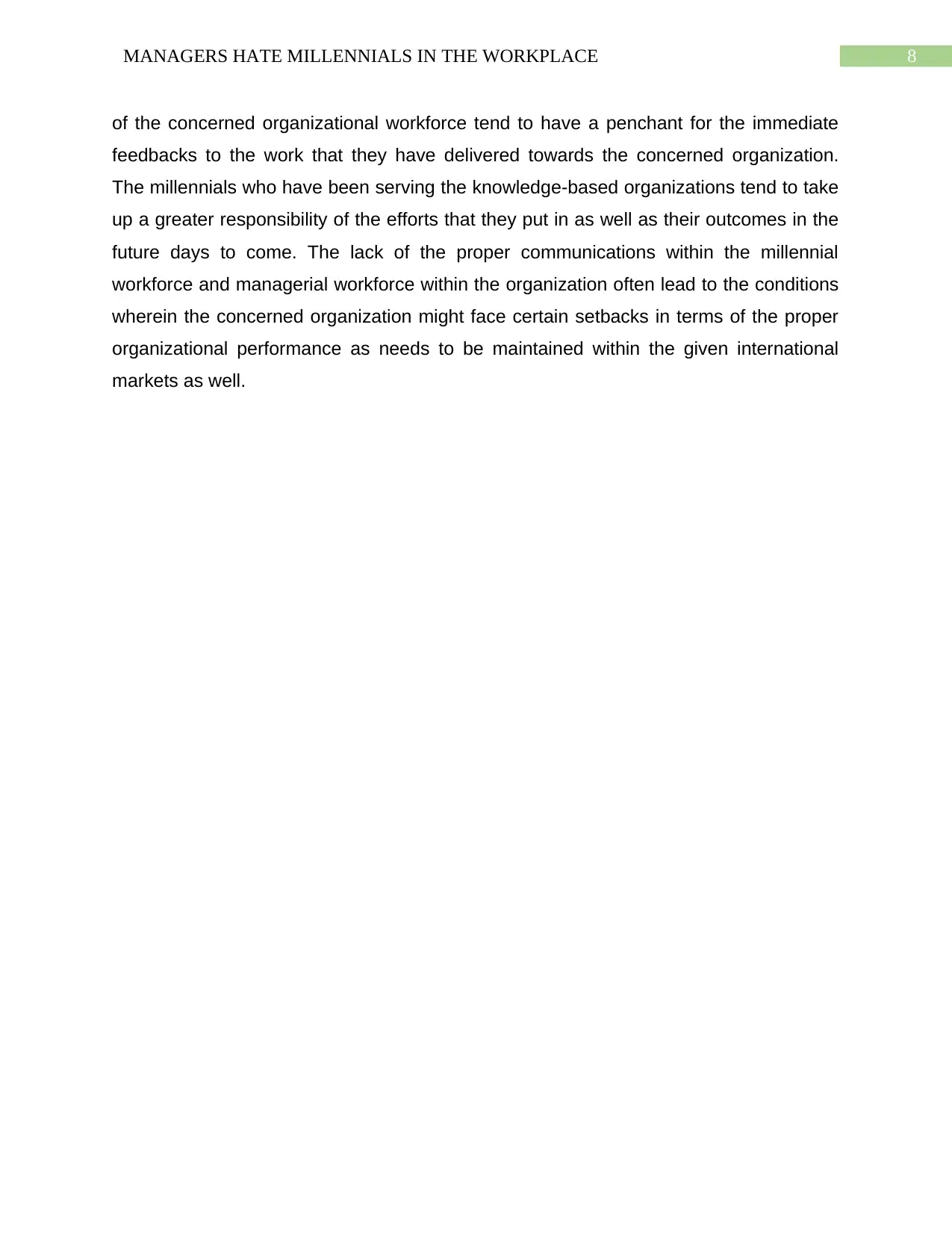
8MANAGERS HATE MILLENNIALS IN THE WORKPLACE
of the concerned organizational workforce tend to have a penchant for the immediate
feedbacks to the work that they have delivered towards the concerned organization.
The millennials who have been serving the knowledge-based organizations tend to take
up a greater responsibility of the efforts that they put in as well as their outcomes in the
future days to come. The lack of the proper communications within the millennial
workforce and managerial workforce within the organization often lead to the conditions
wherein the concerned organization might face certain setbacks in terms of the proper
organizational performance as needs to be maintained within the given international
markets as well.
of the concerned organizational workforce tend to have a penchant for the immediate
feedbacks to the work that they have delivered towards the concerned organization.
The millennials who have been serving the knowledge-based organizations tend to take
up a greater responsibility of the efforts that they put in as well as their outcomes in the
future days to come. The lack of the proper communications within the millennial
workforce and managerial workforce within the organization often lead to the conditions
wherein the concerned organization might face certain setbacks in terms of the proper
organizational performance as needs to be maintained within the given international
markets as well.
⊘ This is a preview!⊘
Do you want full access?
Subscribe today to unlock all pages.

Trusted by 1+ million students worldwide
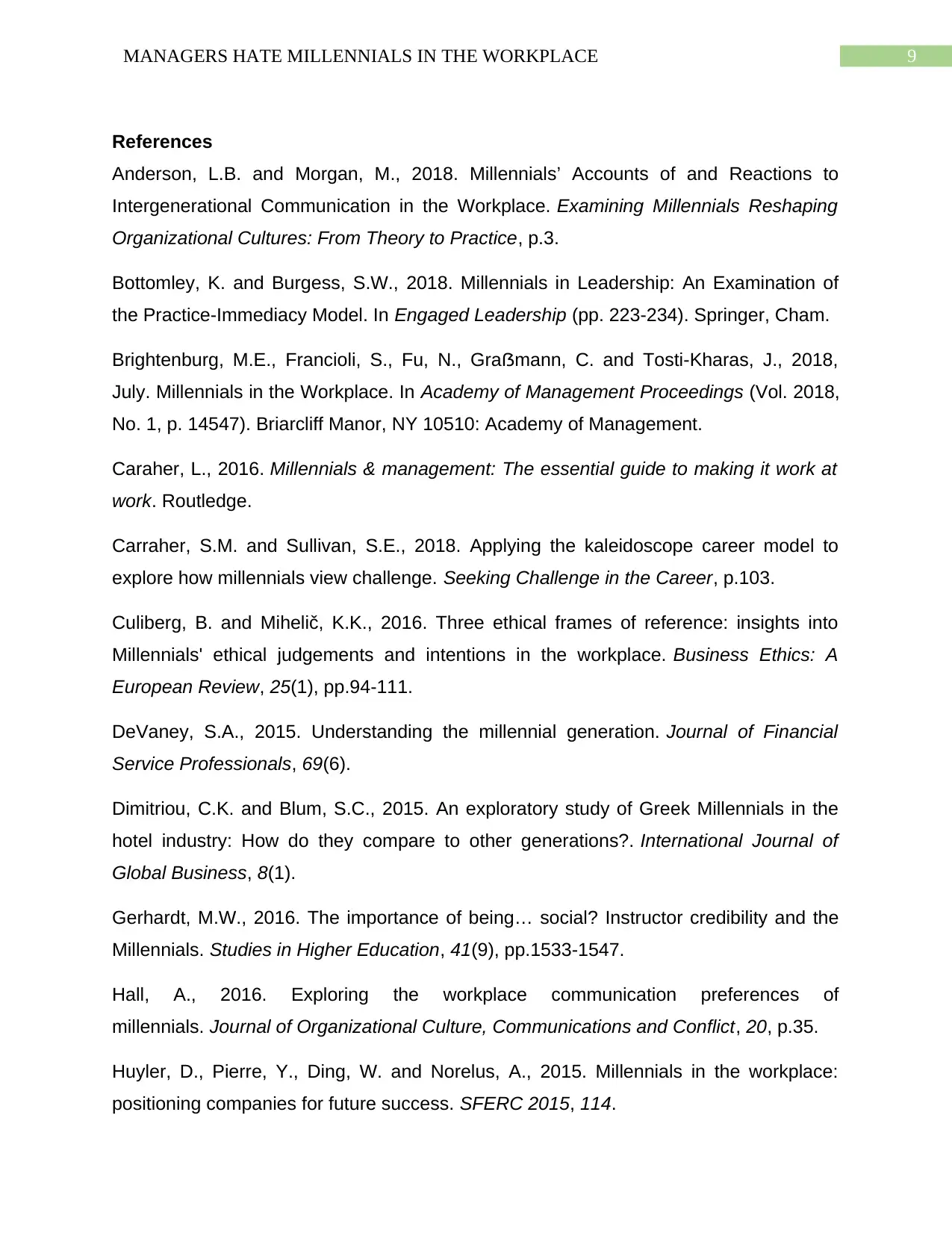
9MANAGERS HATE MILLENNIALS IN THE WORKPLACE
References
Anderson, L.B. and Morgan, M., 2018. Millennials’ Accounts of and Reactions to
Intergenerational Communication in the Workplace. Examining Millennials Reshaping
Organizational Cultures: From Theory to Practice, p.3.
Bottomley, K. and Burgess, S.W., 2018. Millennials in Leadership: An Examination of
the Practice-Immediacy Model. In Engaged Leadership (pp. 223-234). Springer, Cham.
Brightenburg, M.E., Francioli, S., Fu, N., Graẞmann, C. and Tosti-Kharas, J., 2018,
July. Millennials in the Workplace. In Academy of Management Proceedings (Vol. 2018,
No. 1, p. 14547). Briarcliff Manor, NY 10510: Academy of Management.
Caraher, L., 2016. Millennials & management: The essential guide to making it work at
work. Routledge.
Carraher, S.M. and Sullivan, S.E., 2018. Applying the kaleidoscope career model to
explore how millennials view challenge. Seeking Challenge in the Career, p.103.
Culiberg, B. and Mihelič, K.K., 2016. Three ethical frames of reference: insights into
Millennials' ethical judgements and intentions in the workplace. Business Ethics: A
European Review, 25(1), pp.94-111.
DeVaney, S.A., 2015. Understanding the millennial generation. Journal of Financial
Service Professionals, 69(6).
Dimitriou, C.K. and Blum, S.C., 2015. An exploratory study of Greek Millennials in the
hotel industry: How do they compare to other generations?. International Journal of
Global Business, 8(1).
Gerhardt, M.W., 2016. The importance of being… social? Instructor credibility and the
Millennials. Studies in Higher Education, 41(9), pp.1533-1547.
Hall, A., 2016. Exploring the workplace communication preferences of
millennials. Journal of Organizational Culture, Communications and Conflict, 20, p.35.
Huyler, D., Pierre, Y., Ding, W. and Norelus, A., 2015. Millennials in the workplace:
positioning companies for future success. SFERC 2015, 114.
References
Anderson, L.B. and Morgan, M., 2018. Millennials’ Accounts of and Reactions to
Intergenerational Communication in the Workplace. Examining Millennials Reshaping
Organizational Cultures: From Theory to Practice, p.3.
Bottomley, K. and Burgess, S.W., 2018. Millennials in Leadership: An Examination of
the Practice-Immediacy Model. In Engaged Leadership (pp. 223-234). Springer, Cham.
Brightenburg, M.E., Francioli, S., Fu, N., Graẞmann, C. and Tosti-Kharas, J., 2018,
July. Millennials in the Workplace. In Academy of Management Proceedings (Vol. 2018,
No. 1, p. 14547). Briarcliff Manor, NY 10510: Academy of Management.
Caraher, L., 2016. Millennials & management: The essential guide to making it work at
work. Routledge.
Carraher, S.M. and Sullivan, S.E., 2018. Applying the kaleidoscope career model to
explore how millennials view challenge. Seeking Challenge in the Career, p.103.
Culiberg, B. and Mihelič, K.K., 2016. Three ethical frames of reference: insights into
Millennials' ethical judgements and intentions in the workplace. Business Ethics: A
European Review, 25(1), pp.94-111.
DeVaney, S.A., 2015. Understanding the millennial generation. Journal of Financial
Service Professionals, 69(6).
Dimitriou, C.K. and Blum, S.C., 2015. An exploratory study of Greek Millennials in the
hotel industry: How do they compare to other generations?. International Journal of
Global Business, 8(1).
Gerhardt, M.W., 2016. The importance of being… social? Instructor credibility and the
Millennials. Studies in Higher Education, 41(9), pp.1533-1547.
Hall, A., 2016. Exploring the workplace communication preferences of
millennials. Journal of Organizational Culture, Communications and Conflict, 20, p.35.
Huyler, D., Pierre, Y., Ding, W. and Norelus, A., 2015. Millennials in the workplace:
positioning companies for future success. SFERC 2015, 114.
Paraphrase This Document
Need a fresh take? Get an instant paraphrase of this document with our AI Paraphraser
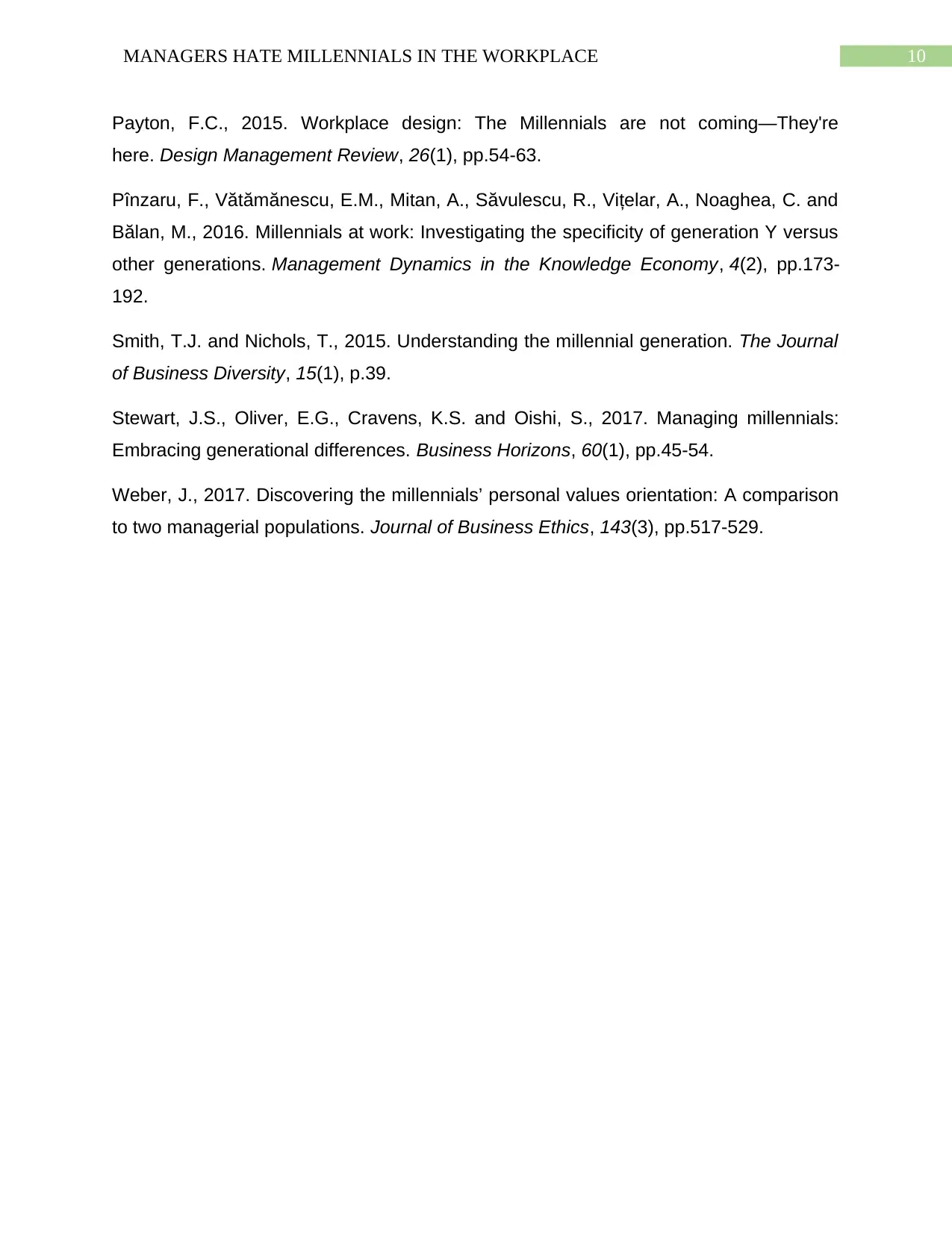
10MANAGERS HATE MILLENNIALS IN THE WORKPLACE
Payton, F.C., 2015. Workplace design: The Millennials are not coming—They're
here. Design Management Review, 26(1), pp.54-63.
Pînzaru, F., Vătămănescu, E.M., Mitan, A., Săvulescu, R., Vițelar, A., Noaghea, C. and
Bălan, M., 2016. Millennials at work: Investigating the specificity of generation Y versus
other generations. Management Dynamics in the Knowledge Economy, 4(2), pp.173-
192.
Smith, T.J. and Nichols, T., 2015. Understanding the millennial generation. The Journal
of Business Diversity, 15(1), p.39.
Stewart, J.S., Oliver, E.G., Cravens, K.S. and Oishi, S., 2017. Managing millennials:
Embracing generational differences. Business Horizons, 60(1), pp.45-54.
Weber, J., 2017. Discovering the millennials’ personal values orientation: A comparison
to two managerial populations. Journal of Business Ethics, 143(3), pp.517-529.
Payton, F.C., 2015. Workplace design: The Millennials are not coming—They're
here. Design Management Review, 26(1), pp.54-63.
Pînzaru, F., Vătămănescu, E.M., Mitan, A., Săvulescu, R., Vițelar, A., Noaghea, C. and
Bălan, M., 2016. Millennials at work: Investigating the specificity of generation Y versus
other generations. Management Dynamics in the Knowledge Economy, 4(2), pp.173-
192.
Smith, T.J. and Nichols, T., 2015. Understanding the millennial generation. The Journal
of Business Diversity, 15(1), p.39.
Stewart, J.S., Oliver, E.G., Cravens, K.S. and Oishi, S., 2017. Managing millennials:
Embracing generational differences. Business Horizons, 60(1), pp.45-54.
Weber, J., 2017. Discovering the millennials’ personal values orientation: A comparison
to two managerial populations. Journal of Business Ethics, 143(3), pp.517-529.
1 out of 11
Related Documents
Your All-in-One AI-Powered Toolkit for Academic Success.
+13062052269
info@desklib.com
Available 24*7 on WhatsApp / Email
![[object Object]](/_next/static/media/star-bottom.7253800d.svg)
Unlock your academic potential
Copyright © 2020–2026 A2Z Services. All Rights Reserved. Developed and managed by ZUCOL.





